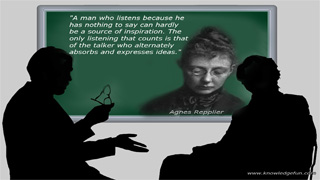When taking notes on a lecture, there are two extremes that present themselves, to take exceedingly full notes or to take almost no notes. One can err in either direction. True, on first thought, entire stenographic reports of lectures appear desirable, but second thought will show that they may be dispensed with, not only without loss, but with much gain. The most obvious objection is that too much time would be consumed in transcribing short-hand notes. Another is that much of the material in a lecture is undesirable for permanent possession. The instructor repeats much for the sake of emphasis; he multiplies illustrations, not important in themselves, but important for the sake of stressing his point. You do not need these illustrations in written form, however, for once the point is made you rarely need to depend upon the illustrations for its retention. A still more cogent objection is that if you occupy your attention with the task of copying the lecture verbatim, you do not have time to think, but become merely an automatic recording machine. Experienced stenographers say that they form the habit of recording so automatically that they fail utterly to comprehend the meaning of what is said. You as a student cannot afford to have your attention so distracted from the meaning of the lecture, therefore reduce your classroom writing to a minimum.
Probably the chief reason why students are so eager to secure full lecture notes is that they fear to trust their memory. Such fears should be put at rest, for your mind will retain facts if you pay close attention and make logical associations during the time of impression. Keep your mind free, then, to work upon the subject matter of the lecture. Debate mentally with the speaker. Question his statements, comparing them with your own experience or with the results of your study. Ask yourself frequently, "Is that true?" The essential thing is to maintain an attitude of mental activity, and to avoid anything that will reduce this and make you passive. Do not think of yourself as a vat into which the instructor pumps knowledge. Regard yourself rather as an active force, quick to perceive and to comprehend meaning, deliberate in acceptance and firm in retention.
After observing the stress laid, throughout this material, upon the necessity for logical associations, you will readily see that the key-note to note taking is. Let your notes represent the logical progression of thought in the lecture. Strive above all else to secure the skeleton — the framework upon which the lecture is hung. A lecture is a logical structure, and the form in which it is presented is the outline. This outline, then, is your chief concern. In the case of some lectures it is an easy matter. The lecturer may place the outline in your hands beforehand, may present it on the black-board, or may give it orally. Some lecturers, too, present their material in such clear cut divisions that the outline is easily followed. Others, however, are very difficult to follow in this regard.
In arranging an outline you will find it wise to adopt some device by which the parts will stand out prominently, and the progression of thought will be indicated with proper subordination of titles. Adopt some system at the beginning of your college course, and use it in all your notes. The system here given may serve as a model, using first the Roman numerals, then capitals, then Arabic numerals:
I.
II.
A.
B.
1.
2.
a.
b.
(1)
(2)
(a)
(b)
In concluding this discussion of lecture notes, you should be urged to make good use of your notes after they are taken. First, glance over them as soon as possible after the lecture. Inasmuch as they will then be fresh in your mind, you will be able to recall almost the entire lecture; you will also be able to supply missing parts from memory. Some students make it a rule to reduce all class-notes to typewritten form soon after the lecture. This is an excellent practice, but is rather expensive in time. In addition to this after class review, you should make a second review of your notes as the first step in the preparation of the next day's lesson. This will connect up the lessons with each other and will make the course a unified whole instead of a series of disconnected parts. Too often a course exists in a student's mind as a series of separate discussions and he sees only the horizon of a single day. This condition might be represented by a series of disconnected links:
O O O O O
A summary of each day's lesson, however, preceding the preparation for the next day, forges new links and welds them all together into an unbroken chain:
OOOOOOOOOO
A method that has been found helpful is to use a double-page system of notetaking, using the left-hand page for the bare outline, with largest divisions, and the right-hand page for the details. This device makes the note-book readily available for hasty review or for more extended study.







